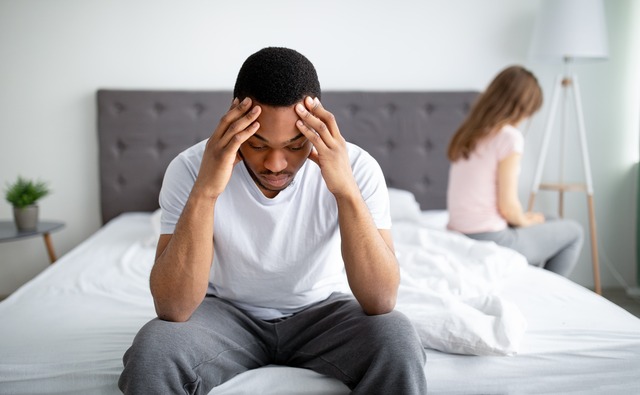Fear and anxiety are powerful emotions that can significantly impact various aspects of life, including sexual health and desire. In men, these emotions can particularly interfere with sexual desire, leading to a range of issues that can affect both personal well-being and relationship dynamics. Understanding the role of these emotional states in dampening male desire is crucial for addressing and managing their effects.

Understanding Fear and Anxiety in Men
Defining Fear and Anxiety: Fear is a response to an immediate threat, while anxiety is a reaction to a perceived future threat or uncertainty. Both can trigger a fight-or-flight response, affecting various physiological processes.
Sources of Fear and Anxiety: These emotions in men can stem from various sources, including societal pressures, personal experiences, relationship issues, and mental health conditions. Performance anxiety, fear of failure, and concerns about sexual adequacy are common.
Cultural and Social Influences: Societal expectations about masculinity and sexual performance can exacerbate feelings of fear and anxiety in men, creating a cycle of pressure and distress.
Impact on Male Desire
Physiological Effects: Fear and anxiety can trigger the body’s stress response, releasing hormones like cortisol and adrenaline, which can inhibit sexual desire and function.
Psychological Impact: These emotions can lead to negative thought patterns and self-doubt, further diminishing sexual interest and confidence.
Relationship Dynamics: Fear and anxiety can strain relationships, leading to communication breakdowns and decreased intimacy, further impacting sexual desire.
The Vicious Cycle of Fear, Anxiety, and Desire
Performance Anxiety: One of the most common fears related to male sexual desire is performance anxiety. The fear of not being able to perform sexually can lead to a self-fulfilling prophecy, where the anxiety itself becomes the cause of the performance issue.
Avoidance Behaviors: To cope with these fears, men might engage in avoidance behaviors, steering clear of sexual encounters, which can exacerbate the problem by reinforcing fears and anxieties.
Impact on Self-Esteem: Chronic fear and anxiety can lead to diminished self-esteem and self-worth, further dampening sexual desire and creating a negative feedback loop.
Addressing Fear and Anxiety
Communication: Open communication with partners about fears and anxieties can alleviate some of the pressure and build a supportive environment.
Professional Help: Therapy, particularly Cognitive Behavioral Therapy (CBT), can be effective in addressing the underlying thought patterns contributing to fear and anxiety.
Stress Management Techniques: Engaging in stress-reduction activities like meditation, exercise, and hobbies can help in managing anxiety levels.
Mindfulness and Relaxation: Practices like mindfulness and relaxation techniques can reduce stress and improve focus, aiding in the reduction of performance-related fears.
Lifestyle Changes: A healthy lifestyle, including a balanced diet, regular exercise, and adequate sleep, can improve overall well-being and help in managing anxiety.
Overcoming the Stigma
Breaking Down Masculine Stereotypes: Challenging societal norms and stereotypes about male sexuality and performance is vital in reducing the shame and stigma associated with sexual health issues.
Encouraging Openness: Promoting open discussions about male sexual health can foster a more supportive and understanding environment.
Educational Efforts: Providing education about the normal variations in sexual desire and performance can help in normalizing these experiences and reducing fear and anxiety.
Conclusion
The role of fear and anxiety in dampening male desire is multifaceted, involving physiological, psychological, and social factors. Understanding these dynamics is essential for addressing and managing their impact on male sexual health. Through open communication, professional support, stress management, and challenging societal norms, men can navigate these challenges and improve their sexual well-being. The journey towards overcoming these fears and anxieties is not only about enhancing sexual desire but also about fostering overall emotional and relational health.
This exploration highlights the complexity of male sexual desire and the significant influence of emotional factors. By addressing fear and anxiety, not only can sexual desire be rekindled, but a deeper sense of self-understanding and emotional resilience can also be achieved.